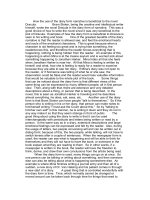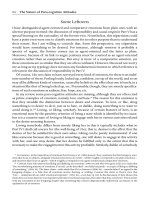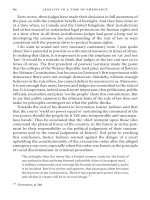The use of refkexive pronouns 3 ppsx
Bạn đang xem bản rút gọn của tài liệu. Xem và tải ngay bản đầy đủ của tài liệu tại đây (210.44 KB, 6 trang )
► Better education for the young 3 Better hospitals for
1 Food for 4 Jobs for
2 Homes for 5 Better pensions for
The old, the rich, etc (A-B)
Rewrite the sentences using a phrase with the and an adjective instead of the underlined phrases.
► People who have lots of money have comfortable lives.
The rich have comfortable lives.
1 We live near a special school for people who can't hear.
2 The old soldiers were holding a service for those who had died.
3 The government should do more for people who do not have enough money.
4 I'm doing a course on caring for people who are mentally handicapped.
3 The young or the young people? (C)
Complete these sentences from a newspaper. Use the adjectives in brackets.
Put in e.g. the hungry or the hungry people.
? Rich nations can afford to feed the hungry (hungry).
? The homeless people (homeless) whose story appeared in this paper last week have
now found a place to live.
1 ……………………… (sick) need to be looked after, so money must be spent on hospitals.
2 Some of (young) at the youth club here are running in a marathon.
3 Life must be hard for ……………… (unemployed) in our society today.
4 What is the government doing to help (poor)?
5 There was a fire at a nursing home in Charles Street, but none of………………………………. (old)
who live there were hurt.
6 …………………………… (homeless) usually have great difficulty in getting a job.
7 There is a special television programme for ……….(deaf) every Sunday morning.
106 Exercises
1 The old, the rich, etc (A)
Write in the missing words. Use the and these adjectives: homeless, hungry, old, sick, unemployed, young
107 Interesting and interested
INTERESTING
The book is full of information. It's very
interesting.
The word interesting tells us what the book does
to Mike — it interests him. A book can be
interesting, boring, exciting or amusing, for
example.
B Adjective pairs
Here are some more examples.
INTERESTED
Mike is very interested in UFOs.
The word interested tells us how Mike feels. A
person can feel interested, bored, excited or
amused, for example.
ING
ED
Tom told us an amusing story. The two-
hour delay was annoying. I didn't enjoy
the party. It was boring. This computer
has some very confusing
instructions.
This wet weather is so depressing. It was very
disappointing not to get the job. The game was
really exciting. Going for a jog with Matthew is
exhausting. I thought the programme on
wildlife was
fascinating. For one
frightening/terrifying moment 1
thought I was going to fall. I just don't
understand. I find the whole thing
rather puzzling. Lying in a hot bath is
relaxing. I think the way Jessica behaved
was quite
shocking.
The test results were surprising. What thrilling
news this is! Congratulations! The journey
took all day and night. They found
it very tiring.
We were amused at Tom's story.
The passengers were annoyed about the delay.
I went to the party, but I felt bored.
I got very confused trying to make sense of the
instructions.
This weather makes me so depressed. I was
very disappointed not to get the job. The
United fans were excited. I'm exhausted
after jogging all that way. I watched the
programme on wildlife. I was
absolutely fascinated. When I
got onto the roof I felt
frightened/terrified. I must say I'm
puzzled. I just don't understand
I feel relaxed when I lie in a hot bath. I was
quite shocked to see Jessica behaving
like that.
I was surprised at the test results. We were
thrilled to hear your good news. After
travelling all day and night they were
very tired.
► This is a depressing place.
1 I'm absolutely …………………… 3 Chess is a ……………… game.
2 I'm …………………. . . in astronomy. 4 This is really.…………………… !
2 Interesting and interested (A-B)
Complete the conversation. Write the complete word in each space.
Vicky: That was an (►) exciting (excit ) film, wasn't it?
Rachel: Oh, do you think so? I'm (1) ……………… (surpris ) you liked it.
I thought it was rather (2) (disappoint ).
Vicky: Well, I was (3)………………………… (puzzl ) once or twice. I didn't understand the whole story.
It was (4)………………………… (confus ) in places. But the end was good.
Rachel: I was (5)…………………………… (bor ) most of th e t ime .
I didn't find it very (6) (interest ).
3 Interesting and interested (A-B)
Complete the conversations using a word ending in ing or ed.
? David: I'm surprised how warm it is for March.
Melanie: Yes, all this sunshine is quite surprising.
? Vicky: I'm not very fit. I was pretty tired after climbing the mountain.
Natasha: Yes, I think everyone felt tired.
1 Trevor: I think I need to relax.
Laura: Well, lying by the pool should be
2 Vicky: It was annoying to lose my ticket.
Emma: You looked really.…………………… when you had to buy another one.
3 Sarah: The cabaret was amusing.
Mark: Claire was certainly ………………. .She couldn't stop laughing.
4 Daniel: The museum was interesting, wasn't it?
Rachel: It was OK. I was quite in those old maps.
5 Matthew: I'm fascinated by these old photos.
Emma: I always find it …………………… to see what people looked like as children.
6 Rachel: Was it a big thrill meeting Tom Hanks?
Vicky: You bet. It was just about the most ………………moment of my life.
I Sarah: You look exhausted. You should go to bed.
Mark: Driving down from Scotland was pretty
107 Exercises
1 Interesting and interested (A-B)
What are they saying? Put in these words: depressing, exciting, exhausted, fascinating, interested
108 Adjective or adverb? (1)
A Introduction
Vicky: / like that song that Natasha sang.
Rachel: Yes, it's a nice song. And she sang it nicely, too.
An adjective (nice) describes a noun (song). An adverb (nicely) describes a verb (sang).
The man had a quiet voice. The man spoke quietly.
Claire wears expensive clothes. Claire dresses expensively.
The runners made a slow start. They started the race slowly.
We do NOT say She sang it nice.
We can use adverbs in other ways. An adverb like really or very can be combined with an adjective (hot) o
another adverb (carefully) (see Unit 115).
It was really hot in the sun. Andrew checked his work very carefully. An
adverb like fortunately or perhaps says something about the whole situation.
Fortunately nothing was stolen. Perhaps Sarah is working late.
B The ly ending
We form many adverbs from an adjective + ly. For example politely, quickly, safely.
But there are some special spelling rules.
1 We do not leave out e, e.g. nice —> nicely
Exceptions are true —> truly, whole —> wholly.
2 y—> ily after a consonant, e.g. easy —> easily, lucky —> luckily
Also angrily, happily, heavily, etc.
3 le —> ly, e.g. possible —> possibly
Also comfortably, probably, reasonably, sensibly, terribly, etc.
4 ic —. ically, e.g. dramatic —> dramatically
Also automatically, scientifically, etc. (Exception: publicly)
C Looked nice and looked carefully
Compare these two structures.
LINKING VERB + ADJECTIVE ACTION VERB + ADVERB
Tom was hungry. Paul ate hungrily.
The children seemed happy. The children played happily.
My soup has got cold. The man stared coldly at us.
An adjective can come after a linking verb such as We use an adverb when the verb means that
be (see Unit 104B). something happens.
Some verbs like look, taste and appear can be either linking verbs or action verbs.
LINKING VERB + ADJECTIVE ACTION VERB + ADVERB
Mike looked angry. He looked carefully at the signature.
The medicine tasted awful. Emma tasted the drink nervously.
The man appeared (to he) drunk. A waiter appeared suddenly.
page 380 American English
108 Exercises
1 Adverbs (A-B)
This is part of a story about a spy called X. Put in adverbs formed from these adjectives:
bright, careful, fluent, immediate, patient, punctual, quiet, safe, secret, slow
The journey took a long time because the train travelled so (►)
slowly.
It was hot, and the sun shone
(1) …………………………
from a clear sky. X could only wait (2)………………………
for the journey to
end. When the train finally arrived, he had no time to spare, so he (3)………………………….
took a taxi
to the hotel. Y was on time. She arrived (4)………………………
at three. No one else knew about the
meeting - it was important to meet (5)
……………….
. 'I had a terrible journey,' said Y.
'But luckily the pilot managed to land (6)
…………
.' Her English was good,
and she spoke very (7) ………………….
X was listening (8)………………………
to every word.
They were speaking very (9)
in case the room was bugged.
2 The ly ending (B)
Look at the information in brackets and put in the adverbs. Be careful with the spelling.
►
(Emma's toothache was terrible.) Emma's tooth ached
terribly.
1
(Henry was angry.) Henry shouted
at the waiter.
2
(I'm happy sitting here.) I can sit here
for hours.
3
(The switch is automatic.) The machine switches itself off
…………………….
4
(The debate should be public.) We need to debate the matter
………………………
5
(Everyone was enthusiastic.) Everyone discussed the idea ………………………………………
6
(We should be reasonable.) Can't we discuss the problem
……………………………
?
7
(The building has to be secure.) Did you lock all the doors
…………………………… ?
3 Adverb or adjective? (A-B)
Decide what you need to say. End your sentence with an adverb ending in
ly.
►
Tell the police that you can't remember the accident. It isn't very clear in your mind.
I
can’t remember the accident very clearly.
1
Tell your friend that United won the game. It was an easy win.
2
Tell your boss that you've checked the figures. You've been careful.
3
Tell your neighbour that his dog barked at you. It was very fierce.
4
You are phoning your friend. Tell him about the rain where you are. It's quite heavy.
4 Adverb or adjective? (A-C)
Vicky is telling Rachel about a dream she had. Choose the correct forms.
l had a (►)strange/strangely dream last night. I was in a garden. It was getting (1) dark/darkly, and it was
(2) terrible/terribly cold. My head was aching (3) bad/badly. I was walking out of the garden when
(4) sudden/suddenly I saw a man. He was sitting (5) quiet/quietly on a seat. He seemed very
(6) unhappy/unhappily. He looked up and smiled (7) sad/sadly at me. I don't know why, but I felt
(8) curious/curiously about him. I wanted to talk to him, but I couldn't think what to say.
I just stood there (9) foolish/foolishly.
109 Adjective or adverb? (2)
A Friendly, likely, etc
The ending ly is the normal adverb ending (see Unit 108). But a few adjectives also end in ly.
Melanie was very friendly. It was a lively party. We had a lovely time.
Some more examples are: elderly, likely, lonely, silly, ugly
The words are adjectives, not adverbs (NOT She-spoke to us friendly). And we cannot add ly.
There is no such word as friendlily. But we can say in a friendly way/manner.
She spoke to us in a friendly way. If we need to use an adverb, we often
choose another word of similar meaning.
It was lovely. Everything went beautifully.
B Hard, fast, etc
Compare these sentences.
ADJECTIVE ADVERB
We did some hard work. We worked hard.
I came on the fast train. The train went quite fast.
We can use these words both as adjectives and as adverbs:
deep, early, fast, hard, high, late, long, low, near, right, straight, wrong (For hardly, nearly, etc, see C.
In informal English, the adjectives cheap, loud, quick and slow can be adverbs.
ADJECTIVE ADVERB
They sell cheap clothes in the market. They sell things cheap/cheaply there.
Back already! That was quick. Come as quick/quickly as you can.
C Hard, hardly, near, nearly, etc
There are some pairs of adverbs like hard and hardly which have different meanings.
Here are some examples.
/ tried hard, but I didn't succeed.
I've got hardly any money left, {hardly any = very little, almost none)
Luckily I found a phone box quite near. I nearly fell asleep in the meeting, {nearly = almost)
Rachel arrived late, as usual. I've been very busy lately, {lately = in the last few days/weeks)
The plane flew high above the clouds. The material is highly radioactive, {highly = very)
We got into the concert free, {free = without paying)
The animals are allowed to wander freely, {freely = uncontrolled)
D Good and well
Good is an adjective, and well is its adverb. The opposites are bad and badly.
ADJECTIVE ADVERB
Natasha is a good violinist. She plays the violin very well.
Our test results were good. We all did well in the test.
I had a bad night. I slept badly last night.
Well can also be an adjective meaning 'in good health', the opposite of ill.
My mother was very ill, but she's quite well again now. How are you? ~ Very well, thank you.









